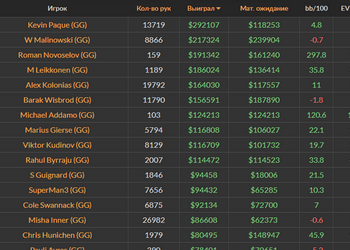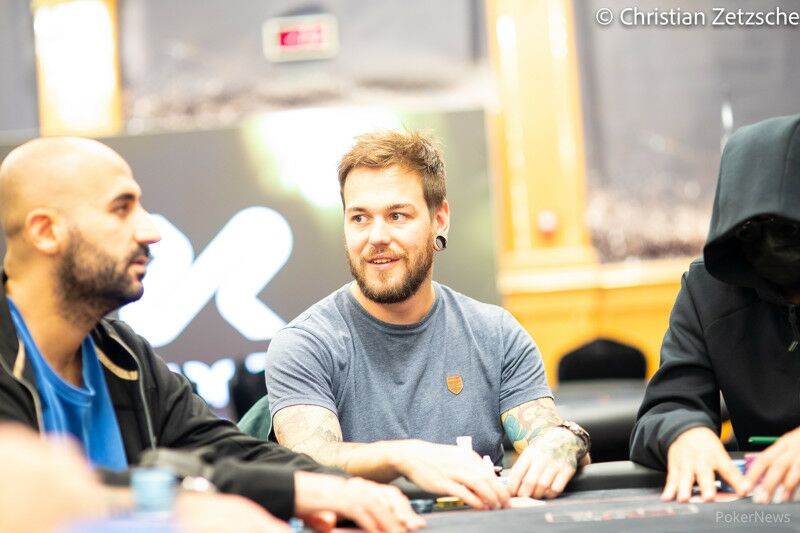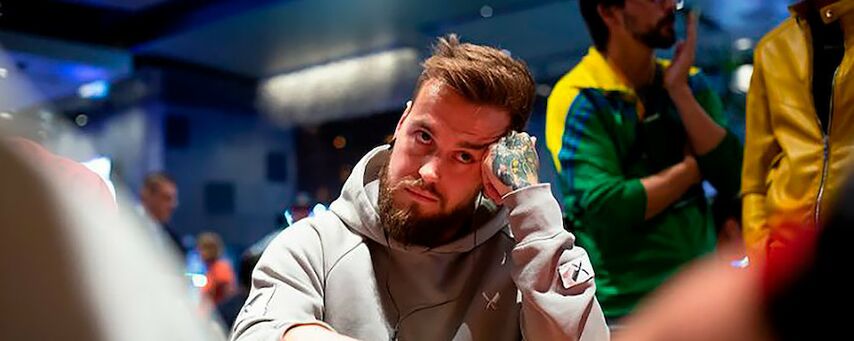Tobias Duthweiler is one of the strongest cash players in the world.

This spring, he was a guest of Adam Carmichael and René "TheWakko" Kuhlman on the Mechanics of Poker podcast.
Career start
My path was not like most players. After school, I spent almost 5 years working with children with developmental delays. It was a very rewarding experience, I realized what really matters in life. It helped me not to worry so much about poker and other small failures later on. I had a small group of 6 children who were abandoned by their families, social services took care of them, and my colleagues and I were engaged in their education and generally helped in any way we could. The work was incredibly difficult, but I am very glad that I got through it and definitely would not change anything. Of course, I still get upset because of some poker failures, but this does not last very long, I quickly understand that there are more serious problems in the world.
I started playing cards in the last years of school. Several years after Moneymaker's victory, poker was everywhere. My friends and I watched poker shows on TV every day and played with each other. Naturally, no one understood anything, but everyone was already sure that they were playing better than the rest. Gradually, I started playing SNGs online and somehow I started to win without studying.
Then a friend and I from our home games started going to the nearest casino. It was right after high school, the smallest game there was NL400, and the two of us had about $1k. It didn't bother us, we started playing and both caught an incredible upswing. Before we knew it, we had $10k. What options did we have next? Naturally, we went for $5/$10. We hadn't lost a single session before. Surprisingly, our upswing continued there as well, and we quickly won another $30k. But it couldn’t go on like this forever, in six months we lost it all, and just after that I got a job.
I took the loss to the uttermost fish from the casino as a personal insult. I was not at all embarrassed that I myself played no better. I decided that quitting poker would be stupid, and they needed to be seriously dealt with. I didn't have any money so I was grinding NL2 online after work. It was not easy, yesterday I had as much as $20k, and now I have to play for pennies. But now I understand that without that loss, probably, a successful career would not have happened at all. And so after a couple of years I returned to the casino and tore up everyone there.
My job took up 40 hours a week, and then I was still seriously involved in handball and spent 12 hours a week in the gym. And I played poker in any free minute, mostly on weekends. I studied the theory based on the materials on PokerStrategy. At work, I signed contracts first for a year, then for 2.5. In the first year of my last contract, I already played NL50, and at this limit I faced my first serious downswing online. It was not even a downswing, rather, I felt that I had stopped developing. I continued to play a lot, but there was no movement forward.
I played about 40,000 hands at 0 win rate and turned to a coach, who turned out to be Steffen "Go0se.core!". This happened in 2014 or 2015. He had already played medium stakes and helped me a lot, literally opened my eyes to many situations. After that, I skyrocketed to NL200, and still combined poker with working with children. But poker was already bringing in a lot of money, and for the first time I thought about a professional career. Before that, my main motivation was the desire to break the local regs in my casino. I worked for five days, and on weekends I went to play $5/$10 and consistently won a couple of thousand.

At NL200 online, I realized that poker is not limited to this, it can be more interesting. I took a vacation for three weeks, closed myself in my room and decided to spend this time as if I were a real professional, that is, I played without getting out. I liked it and three weeks later I announced to my parents that I was quitting my job. I always had the option to return, especially since I really liked the work. But in poker, in the end, it also turned out well. Now my parents fully support me, but then it was a complete shock for them. They have not yet forgotten how I lost all my money in the casino. They thought I was some kind of gambler. Mom was extremely happy when I got a job, so when I quit, at first she was very worried.
Transition to professional
There is not much to tell here, the usual boring story. I grind every day for 10, sometimes 14 hours. But every minute that I spent at the poker table, I enjoyed it. I didn't have to force myself to play at all, I really enjoyed it a lot. I have never had problems with self-confidence, perhaps you can even call it arrogance. If something fascinates me, and I completely focus on it, I will definitely succeed.
In handball, I did well, but on a global scale, my success was very average. But in poker, I knew right away that I would become very successful. Money was one of my main motivators. I always find it funny when successful players say in interviews that they don't play for the money. Who are you fooling? But I partially share the approach of the regulars, who treat money as ranking points in a computer game. Competitiveness in poker is also very important. I do not want to be misunderstood – I play poker not only for the money, but I will not pretend that I do not care about it.
About the strongest players
You could say that whoever wins the most is the strongest, but that's not how it works in poker. If we look at the lists of the most profitable players, on the first lines we will most likely see players who are better game selectors. This is also a very important skill, but it says almost nothing about the level of the game. For me, the strongest players are those who hold the lobby and are not afraid of the Regwars.
But we must not forget that when climbing to high stakes, luck and chance play a significant role. I do not rule out that there are enough players at medium stakes who are not technically weaker at all, they just haven't had for their chance yet.
When it comes to specific star players, Linus and Stefan come to mind first. I don’t know why they stand out so much, otherwise I would have beaten them a long time ago, ha ha. Most regulars, and I am no exception, sit on solvers all day and check all interesting hands. But in the case of Stefan, all this is meaningless, he does things that no solver can help figure out. I consider him a real genius and honestly admit that I have long been a huge fan.
Problems at the middle stakes
At NL500, I also started to stagnate, and the coach helped me again. But this time not Go0se.core!, but Uri Peleg. When you use the solver every day, it is very easy to start mindlessly copying it. This is an erroneous approach, you need to ask yourself all the time why and why the solver does something. Just in this Uri helped me a lot. If people ask me what is the most important thing when moving from NL100 to NL500, I answer – stop sitting in software for hours and copying GTO. Much more important is a deep understanding of it's recommendations, you must learn to understand the logic of the solutions recommended by the solver. When I started coaching middle stakes guys myself, it was a shock to me how few of them understood this.
In matters of psychology, I am not the best role model. I don't seem to deal well with setbacks, but I managed to avoid long downswings when climbing to high stakes. I played at zero in zoom500 for almost a year and after that skyrocketed to NL10k at the speed of light with a very good win rate. Of course, this greatly influenced the progress of my career. One negative session, even when I was losing a lot, did not affect me in any way. It also helps a lot to get over setbacks because I just really enjoy playing. I've always grinded a lot and didn't pay attention to variance. At the same time, I traditionally wasn't scared by the highest stakes. I was never afraid to take shots and went to them consciously. I could grind NL5k-10k for months, and then make a bad shot and lose 20 times more in a session. It was painful but these losses also gave me strength. You could even say that I liked them as much as the winnings. Most of all, I perceived a long game at zero.

When climbing through high stakes, I had only one noticeable problem. At each new limit, I was sure that only geniuses play here. Just because of this, the first shots often turned out to be unsuccessful, I was too smart and tried to outplay my opponents where it was not required. But in reality, it turned out that the game practically did not change – there was no difference between NL5k and NL20k. It was enough just to continue to stick to the proven strategy.
The most important poker lesson
Tomorrow will be a new day. Sometimes you just need to turn off your computer and go for a walk. Now I am much better, but in my youth there were big problems with this. After a big negative session, I ould sit in front of the monitor for another 14 hours to recoup. But it's not always worth chasing EV, it's better to return to the tables after a break, well rested. All professionals have good and bad days, one session will not change anything. But psychologically, it is still very difficult for me to end the session. The first feeling is always – I'm making a big mistake, I need to continue. But it is worth being distracted by some business, for example, chatting with friends or a girlfriend, and I quickly return to normal.
Emotions at the table
Online, I don’t hold back my emotions at all and often get angry. I can write to friends in discord, ''what an idiot opponent''. I don't see anything wrong with that, there's nothing personal about it. I’m even glad for this opportunity, letting off steam, but it doesn’t affect my game in any way. Live, we cannot hit the table in anger after our mistake. Although some do and it looks pretty funny. And at home in front of the computer, no one will interfere with this. The main thing is that this does not affect the thought process.
What annoys me the most is when I lose to a weaker player. I don’t mean some bad distributions, I’m talking about situations in which I myself made a mistake and donated too much. And I understand how stupid it is. Then I look at the overall chart and see with what advantage I replay them. But individual hands still piss me off. Such an irrational reaction.
Future plans
I try not to guess. I plan to play as long as it brings me pleasure. Poker is a diverse game, there's something new every day, no hand is the same, and that's what really fascinates me. It would seem that I learned all the basic strategies a long time ago, all situations should be familiar to me, but when I analyze my sessions, it turns out that I make at least five mistakes every day. How is this possible? But this is quite normal and common to all regulars.
The poker ideal is unattainable, but it is precisely to it that one should strive. Although I can’t say for myself that it is this goal that drives me. I prefer to play consistently at a high level and outplay opponents. The last two years have been a real breakthrough for me. Before that, I have not played more than NL2k, and now NL5k is my minimum limit. My results are quite good. I understand that I can’t beat Linus yet, but getting into the top 10 of the strongest regulars is quite within my power, and this will be an incredible achievement.











